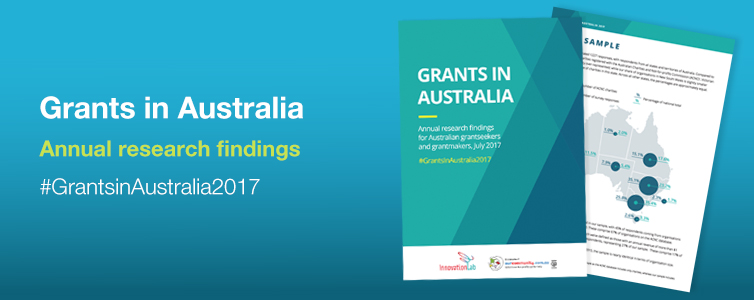Media Release

Large organisations are winning small grants as well as big ones, pressure is building on local government grants budgets, and a huge amount of effort is being wasted on grant applications that are started and never finished.
They're just three of the findings from the latest Grants in Australia report (see bottom), part of a decade-long research project produced by Our Community's Innovation Lab that charts the field of grantmaking from the not-for-profit sector's perspective.
More than 1200 individuals, all of whom were involved in applying for or receiving a grant in the previous 12 months, took part in the 2017 survey. Findings included:
- Big organisations: small grants
Large not-for-profit organisations (those with annual revenue of more than $1 million) are not just winning large grants, they're scooping up many of the small grants (less than $5000) on offer as well. - Pressure building for local government
State/territory governments are the most relied-upon source of grants for not-for-profit organisations, but their importance is declining over time, while local government is becoming increasingly important, particularly for small not-for-profit organisations. - Corporates continue to lag
Corporate grantmaking in Australia was building as an important source of funds for not-for-profits between 2007 and 2010 but fell away after that and its prominence has not yet recovered to 2010 levels. - Grantseekers report increasing success (though there are sectoral differences)
Not-for-profit organisations are reporting either stable or increasing success in getting grants. Sport and recreation and arts and culture organisations apply for fewer grants than organisations from other segments of the not-for-profit sector. - There's work to do in reducing non-completion rates
A huge amount of time is being wasted on applications that are started then abandoned. More than half of the people we surveyed said they'd started an application that they didn't end up submitting. - Moving to more strategic grantmaking
Multi-year grants and grants for core costs are getting harder to get, despite ongoing campaigns to encourage more of this type of funding, while a third of grantseekers report difficulties in forming a meaningful relationship with a grantmaker. - Funders, if you only do one thing this year …
Grantmakers need to get better at providing feedback to unsuccessful applicants. We've taken the pulse on this issue for more than a decade and grantseekers still highlight this as a key pain point. - Grantmakers like outcomes reporting. Paying for the reports, not so much
Grantseekers are increasingly asked for evidence of outcomes, but are overwhelmingly being forced to fund their own outcomes measurement activities. - The shift to online forms is not yet complete
Grantseekers' preferences for application forms switched from offline electronic forms (fillable PDFs and Word documents) to online electronic forms around 2013, yet a good chunk of grantmakers still use offline electronic forms to collect applications. - Habits of successful grantseekers
Successful grantseekers are more likely than unsuccessful grantseekers to form a relationship with grantmakers, and less likely to start an application that they don't take through to completion.
Analysis of this year's results, as well as comparison with previous years' results, has produced a wealth of lessons for grantmakers and grantseekers. Both groups can download a tailored action list designed to translate survey insights into real-world actions.
Not-for-profits can also compare their grantseeking habits against their peers via a benchmarking tool that's also being released today.
"We try to make sure the research we do is not just interesting, but useful," said Our Community executive director and "chaos controller" Kathy Richardson.
"About $56 billion is distributed across Australia in grants to registered charities each year by local councils, state and federal government agencies, and that's not including philanthropic trusts, family foundations, community foundations and corporate foundations - a mass movement of money mainly to social causes.
"But good outcomes are not guaranteed. We want to play a part in ensuring that every precious grant dollar is used to produce the maximum benefit for Australian society. This study forms an important part of that aim."
The Grants in Australia study builds on a string of surveys conducted by Our Community since 2006. This year's data analysis was overseen by Our Community's data scientist Joost van der Linden, with subject matter expertise contributed by Our Community's Funding Centre, Australian Institute of Grants Management and SmartyGrants staff.
Leading grantmaker Jon King from the Community Broadcasting Foundation previewed the study, and was shocked to learn that 38% of grantseekers failed to meet grant deadlines. "What a waste of time. This is time you could have used for your cause, or to cold-call potential sponsors," he said.
The full report, as well as the benchmarking tool and actions lists for grantmakers and grantseekers, are available at www.ourcommunity.com.au/grants2017.
Grants in Australia Report:
(PDF 5.2mb)
